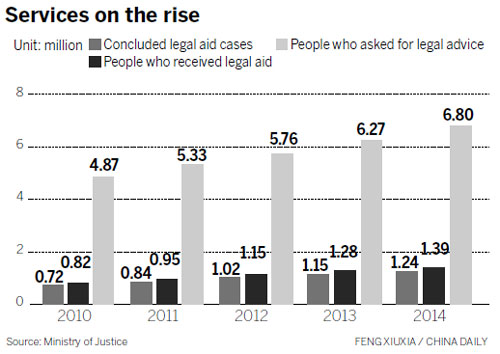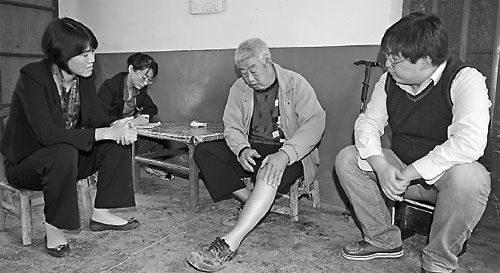Free legal aid program sees expansion
Justice Ministry plans to increase the number of people and cases that qualify for assistance
Qin Zhihui, better known by his online alias Qin Huohuo, became "famous" for spreading rumors.
From 2011 to 2013, the former employee of a Beijing marketing and planning company fabricated stories on 10 micro blogs to attract public attention. He slandered celebrities, including popular television hosts Yang Lan and China Disabled Persons' Federation President Zhang Haidi, and he posted a comment saying the government had paid more than 200 million yuan ($32.2 million) to compensate a foreign victim who died in a 2011 train incident in Wenzhou, Zhejiang province - a fabrication.
The 30-year-old said he did all of this to seek fame and fortune. But when he was arrested in 2013, the young man from a poor family did not have enough money for a lawyer, so he applied for free legal aid and was accepted.
What surprised him was that the designated lawyer tried her best to help him get lenient punishment.
"I didn't expect I would get lenient punishment, considering the bad social influence of my case," said Qin, who was sentenced in Beijing Chaoyang People's Court in April 2014 to three years in prison for defamation and causing trouble.
"The lawyer actively defended me during the court hearing, and the court accepted some of her defense opinions when handing down the prison term."
Sun Xiaoyang, the designated lawyer for Qin, was paid only 2,000 yuan from the Beijing Legal Aid Center for her service in Qin's case, but she said money was not her concern. "What I care about most is helping people in need to obtain their legal rights rather than seeking benefits," she said.
After Qin was detained in September 2013, Sun immediately applied to meet him in the detention house to tell him his legal rights and learn about the case. She met with Qin more than 10 times during the whole legal process. She went to the prosecuting department to read the case files, actively exchange evidence and discuss her concerns with prosecutors before the court hearing to streamline the issues and exclude illegal evidence.
"The difficulty I encountered was more technical - there were lots of electronic documents and I needed to compare them with each other to discover the differences and flaws to provide new evidence to the court," she said.
Qin was one of the more than 1 million people who received free legal aid services last year.
Cases go up 9 percent
Statistics provided by the Ministry of Justice show that national legal aid departments under local justice authorities concluded 1.24 million legal aid cases last year, and offered aid to 1.39 million people, a year-on-year increase of 9 percent. Meanwhile, the amount of legal aid funding reached 1.7 billion yuan last year, an increase of 4.8 percent compared with 2013.
As China transforms its political and economic growth model, social conflicts are rising sharply, and the interests of vulnerable groups are at stake. Zhao Dacheng, vice-minister of justice, said the ministry has been trying to improve the 20-year-old legal aid system, and one of the big moves is to lower the threshold and expand the number of people who can receive free legal aid in a bid to protect their rights.
Free legal aid will now be extended to those involved in civil disputes and criminal cases involving people's livelihoods, such as marriage and family, food safety, education and healthcare, he said.
Meanwhile, people with very low incomes and those who don't hire lawyers will also be eligible for free legal aid, he said.
The moves are in response to a key meeting hosted by President Xi Jinping in May. According to the meeting, legal aid is an important livelihood project, and the protection of people's rights and interests should be taken as the new starting and ending points.
"The purpose of improving legal aid is to expand the scope of free aid services and improve its quality so that eligible people will get legal aid and have equal access to justice," Xi said at the meeting.
In June, authorities issued a notice that listed measures for this goal, which can better protect people's legitimate rights, Zhao said.
"Now, once suspects are detained by the police, lawyers can immediately meet with them in the detention house to offer legal assistance. ... But before, once criminals were detained, the lawyers had no means to meet or get in contact with them for 48 hours," he said.
"In the past, the police also wouldn't tell the lawyers about progress in the investigation, which seriously violates suspects' legal rights. Now, once suspects are captured, lawyers will provide them free legal aid services during the whole judicial procedure, such as police interrogation, prosecution and court sentencing to protect their human rights."
In addition to expanding the number of people eligible for legal aid, another measure listed in the notice is to broaden people's access to legal aid. According to Sun Jian-ying, director of the ministry's legal aid department, 3,700 legal aid centers have been set up across the country, with more than 4,700 lawyers offering free legal aid services, including providing legal consultation, representing criminal cases and mediating civil disputes.
Now, the ministry plans to set up more legal aid working stations in local detention houses and courts.
To date, more than 1,500 legal aid working offices have been established in detention houses across the country, and the ministry will set up local legal aid working stations in the pilot courts to offer legal consultation to the parties involved in appeal cases, she said.
People who are unable to move easily, such as the elderly and the disabled, can use the hotline 12348 or the websites of local legal aid departments, she said.
Websites and hotlines have proved to be effective tools for people with demands for legal aid. According to statistics provided by the ministry, 6.8 million people applied for legal assistance last year, and most of them sought consultations through the websites or hotline.
In Jiangsu and Hubei provinces and Beijing, justice departments now regularly publicize legal aid information on their micro blogs or WeChat accounts. Designated lawyers also offer legal consulting on these social media platforms, she said.
Li Xuelian, a senior official at the ministry's legal aid department, said that among the legal aid services they handled, more than 80 percent were civil cases, with most related to payment and employment disputes, marriage and domestic affairs and traffic accidents. Others were criminal cases and administrative litigation.
The notice also highlighted the priority of accelerating legislation for the country's legal aid service.

Quality control encouraged
When the legislation is complete, "appropriate authorities could clarify their tasks and work closely to improve the quality and professionalism of legal assistance and protect people's legitimate rights", said Zheng Huiyun, director of the Beijing Legal Aid Department.
She said the application procedures for legal aid services should be regulated, and more effort should be devoted to evaluating the quality of legal aid services and the mechanism for handling complaints from recipients of legal aid.
In addition, authorities, including the Ministry of Finance, should invest special funds to support the legal aid program and increase lawyers' subsidies for legal assistance. At present, a lawyer only receives an average of 1,500 yuan for a civil case and 1,200 yuan for a criminal case, she said.
According to Sun of the legal aid department, the ministry plans to invest at least 400 million yuan to support legal aid this year, and it also plans to increase lawyers' subsidies for legal assistance.
Sun said the legal aid departments under local justice authorities will also establish an online updated database of legal aid recipients.
zhangyan1@chinadaily.com.cn
|
Staff members from a legal aid center in Xi'an, Shaanxi province, visit Wang Chang'an (second from right). Wang, who lives in Gaoling county, asked for legal advice after being injured. Liu Xiao / Xinhua |

(China Daily 07/22/2015 page5)




